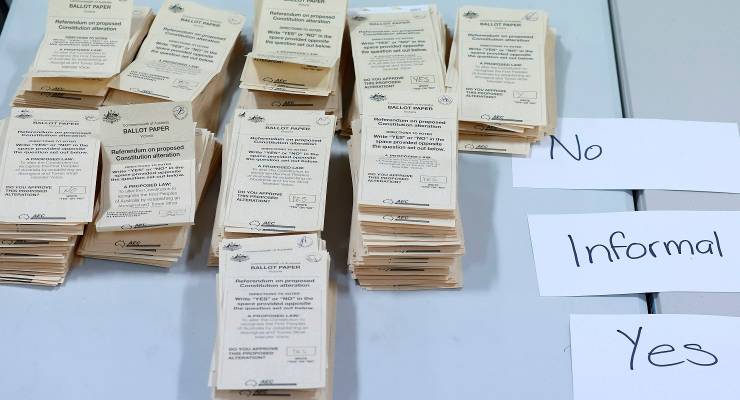
Regardless of how one feels about the Voice to Parliament referendum result, there’s some highly informative data emerging from it. If we’re serious about closing the gap, we must learn from this information and address the prevailing attitudes and beliefs that made this result inevitable.
On the quantitative side, it is abundantly clear that Indigenous people living in remote communities of the Northern Territory, South Australia, Western Australia and Queensland voted overwhelmingly for the Voice. My analysis of Australian Electoral Commission (AEC) data suggests that 35 of 39 mobile voting booths in these communities chose Yes, at an average margin of 70%. Heat maps of voting geographic patterns support this.

Those who claim that Aboriginal and Torres Strait Islander peoples did not want the Voice are simply wrong. To imply that they were influenced by AEC staff and election material is not only deluded but also highly patronising (the “tyranny of low expectations” indeed).
Looking at entire electorates paints a very different picture. Here, a higher Indigenous population is associated with a stronger No vote. This must not be interpreted as First Nations peoples voting No (which many have done). Consider this: an electorate with 20% Indigenous voters would be considered high (nationally the figure is 3.8%). Even with every Indigenous voter saying Yes, the result still fails if just 63% of non-Indigenous voters say No (as the nation did).
Looking at the results by polling booth (combined with the strong support for Yes in low-Indigenous city electorates), it’s pretty safe to surmise that non-Indigenous voters in regions with a high Indigenous population were more likely to vote No.
Putting it plainly, familiarity seems to breed contempt. But why? Here, the qualitative data can inform.
Kos Samaras (RedBridge Group Australia) and Shaun Ratcliff (Accent Research) have been releasing results of voter surveys taken just before the referendum. Various findings emerge: support was highest among Labor and Green voters, the young, and voters living in inner-metropolitan areas. A strong gradient along education level (towards Yes) and age (towards No) was evident.
But the most telling — and startling — was that 47% of voters surveyed do not think First Nations peoples face more discrimination than “white” Australians, with a quarter saying that it is in fact white people who face more discrimination. Of these, 80% voted No.
Given the appalling health and social outcomes of Indigenous peoples compared with non-Indigenous Australians, this figure is surprisingly high. But it is what it is, as they say. It may explain the higher No vote in electorates with higher First Nations populations (“Why do they get a Voice and we don’t?”) and is, in my opinion, the main reason why the nation voted No.
We can only speculate on why this attitude is so prevalent. But using the findings to bash people in outer metropolitan and regional electorates is counterproductive. (If anything, blame Australia’s two-tier education system, which seems to attract ongoing bipartisan support.)
We need to be honest and pragmatic. These are entrenched attitudes, unlikely to be the result of a highly negative, aggressive No campaign (which it was). Ceteris paribus, these beliefs were never going to be shifted by more information and communication by the Yes campaign, as some are suggesting.
Changing them is a generational project that straddles about half a dozen policy portfolios. But change them we must if reconciliation — and Closing the Gap — are to be realised some day.
If we are dinkum about improving the lives of Indigenous peoples, we must embark on this journey. Long-term political and policy strategies are needed to educate, inform and win the hearts and minds of white, middle Australia. It is the only thing that will make the goal of Closing the Gap possible.








“We can only speculate on why this attitude is so prevalent….If anything, blame Australia’s two-tier education system, which seems to attract ongoing bipartisan support.” As an immigrant to Australia, I have been amazed at the general consensus around taxation and its social welfare distribution. It does not surprise me that people feel as or more disadvantaged than First Nations people in the face of overwhelming evidence to the contrary. We have been called ‘battlers’ for years and appear to think that taxation is about giving the government money and then the government giving it back to us. No matter our financial circumstances. The view that if we pay for our child to go to a private school and pay taxes some of our taxes should go to that private school seems quite common. Come budget time the media plays up the question what’s in it for me? Winners and losers! ‘The government should give it to me’. The idea that taxation can be used to address serious disadvantage in society seems to be losing traction in Australia.
This ‘pay-per-use’ attitude has been fostered for literally decades through the increasing dominance of neoliberal economics and policies, and reinforced by the steady decline in public services under conservative Governments. It’s visible in schooling (private schools), healthcare (private health insurance), roads (more and more tollroads), pretty much everything.
(Indeed, on the latter, as I’ve discovered in the last few days, it seems to be triggerable in most lefties just by leaning in and whispering “road usage charge”.)
Our consolidated RW ‘medium’ that platforms property, personality politics/polls, consumerism, sport, entertainment and antipathy towards anything non ‘skip’ & centrist.
The latter is evidenced by negativity towards refugees, immigrants, unions, climate science, elites, woke, ALP etc. that can encourage negative reactions, then avoidance or burying anything positive on the same?
Some visitors to Oz notice and ask why do many Australians seem so unhappy and complaining, in one of the wealthiest nations in the world?
A word that doesn’t get used much is stigma. Aboriginal Australians, despite considerable inroads having being made, are still very subject to a bunch of prejudices and stereotypes about who they are, how they behave and how responsible they are for any disadvantage they might have. These preconceptions are not conceived as prejudices but as knowledge. Thus the ability to hold them and simultaneously claim, I am not racist, ie. I am not irrational, how dare you!
They provide a platform for racism and a platform for the types of “arguments” put forward by Price et.al. Ones that denied Aboriginal disadvantage and therefore a need for a Voice and much else. These were not arguments just assertions that accorded with the stigmatising pre-conceptions.
Education has been slowly making inroads on the stigma but it is a hard and long road. It is made harder when powerful groupings of the Right, including two of the four main parties, keep aiding and abetting its reinforcement. Not to mention periodically exploiting it. But then exploiting stigma is one of the Right’s stocks in trade. Sometimes it’s all they have.
Correct. My uncle lives in Port Augusta where the local indigenous are implicated in a lot of local crime and visible anti social stuff and he and nearly everyone he knows were rabidly NO voters. Very unhappy with my attitude that all that stuff might improve over time if there was a successful YES vote.
Hard to change them when half of the political and media establishment is responsible for creating and reinforcing them.
Exactly, Luke. We need the Truth, Voice having failed. Starting in schools. Most kids are into truth (however bleak) and justice. Start with the teachers, perhaps. One at the local primary school told the children that Aboriginal people eat roadkill.
Yes. Let’s get on with that long march through the institutions the Right (and more latterly Rundle?) were so paranoid about.
my kids’ schools are terrific on this actually. they’re learning Nyoongar words and culture. gives me hope (despite some parents complaining)
What if we can’t handle the Truth?
And why is the word ‘truth’ in capitals?
That implies it’s some kind of definitive thing…..
Reply#2 – additional to #1 still awaiting approval.
We can certainly handle the truth: truth is easy. It’s refusing to even look for it which is harmfull.
… And the odds for that shift?
Not in my lifetime, while the Labor Party is but a pale pink version of the LNP.
There’s no little morality in no votes….
i did say it’s generational …
Not just the ALP, but its older base too which is similar to LNP’s in many ways….